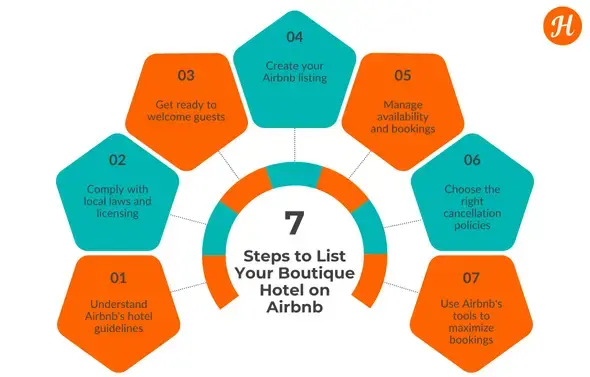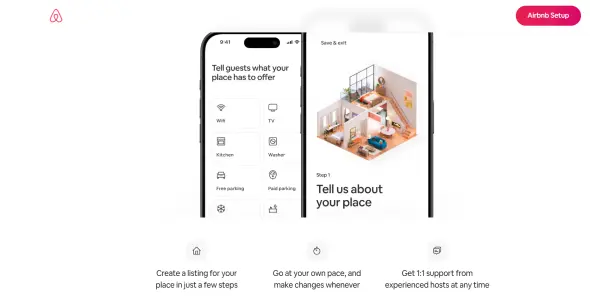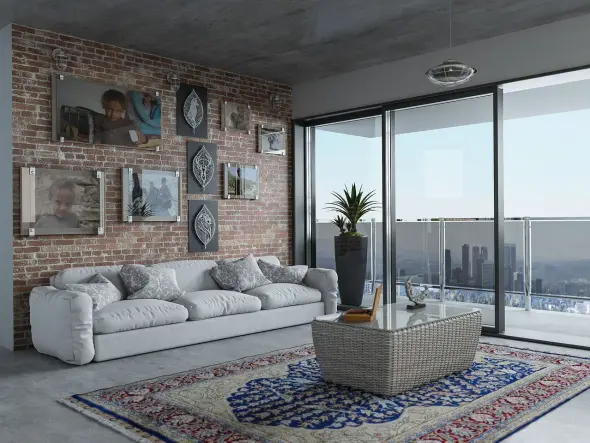How to List a Boutique Hotel on Airbnb
Boutique hotels aren’t just having a moment — they’re reshaping how we travel. While the hotel industry still dominate the landscape, more and more travelers are craving something different: stays that feel personal, local and full of character.
Airbnb, once known for spare rooms and shared serviced apartments, has evolved into a global platform for all kinds of accommodations and boutique hotels are thriving because of it. In fact, according to Grand View Research, the global boutique hotel market was valued at $25.04 billion in 2023 and is projected to grow at a steady 7.1% CAGR (Compound Annual Growth Rate) through 2030.
That rising demand for design-forward, one-of-a-kind stays presents a huge opportunity for boutique hotel owners. And in this blog, we’ll show you exactly how to list your boutique hotel on Airbnb — and connect with a new generation of guests looking for stays that are anything but ordinary.
Why Boutique Hotels Fit Well on Airbnb
Airbnb travelers aren’t just looking for a place to sleep — they want an experience. They gravitate toward short-term rentals that reflect the destination, offer personalized service and provide a memorable stay. Boutique hotels are well-suited for this kind of travel because they strike a balance between style, comfort and individuality.
Unlike standard hotels rooms, boutique properties often tell a story. Whether it’s a restored historic building, a locally-inspired design theme or community-driven amenities, boutique hotels deliver the personal touches that modern travelers value.
What Makes a Boutique Hotel Ideal for Listing on Airbnb

Rooms with local flavor: Boutique hotels often feature decor and architecture influenced by local history, art or traditions. These visual and atmospheric details create an authentic feel that resonates with guests.
Common spaces for guests: Many boutique hotels have lounges, gardens, rooftops or cafes where guests can relax and socialize. These shared spaces enhance the community feel and provide opportunities for events or informal gatherings.
Personal hospitality: Unlike larger hotels with rigid systems, boutique properties can offer customized guest experiences. This includes things like welcome gifts, handwritten notes, personalized local recommendations and attentive, human-to-human service.
Flexible property types: Airbnb’s platform supports everything from single hotel rooms to full-property short-term rentals. This is especially beneficial for boutique hotels that want to list individual rooms, multiple rooms or even entire homes on the same property.
7 Steps to Bring Your Boutique Hotel to the Airbnb Market

Step 1: Understand Airbnb's hotel guidelines
To list your boutique hotel on Airbnb, your property must meet certain standards. Airbnb values accommodations that provide a unique and high-quality guest experience. This means your rooms should be designed with care, incorporating local influence or thoughtful personal touches that create a home-away-from-home feeling.
It’s also important to upload clear, high-resolution photos that show off both individual rooms and any shared spaces, like lounges or terraces. If your property includes accessibility features, such as ramps, elevators or adapted bathrooms, highlight those as well.
Beyond aesthetics, Airbnb encourages hotels to offer spaces where guests can connect — such as communal lounges or outdoor areas. These elements help create the kind of social, immersive environment that Airbnb guests appreciate.
Step 2: Comply with local laws and licensing
Before you publish your Airbnb listing, make sure your business complies with local regulations. This is especially important for professional hospitality businesses that operate across multiple cities or manage more than one property type.
Depending on your area, this may include obtaining business licenses, complying with short-term rental laws and adhering to zoning requirements. Some cities require hospitality businesses to register or pay local taxes. Failing to comply can lead to penalties or having your listing permanently removed.
It’s important to check your city or municipality’s website for specific rules around hospitality businesses and short-term rentals.
Step 3: Get ready to welcome guests
To meet guest expectations, you should make sure your boutique hotel rooms are well-prepared with distinctive amenities. These might include locally made toiletries, artisanal snacks or curated welcome kits.
In addition to physical amenities, offer resources that help guests explore the area. Local maps, guidebooks or digital recommendations can enhance the guest experience. It’s also crucial to have a responsive staff member or property manager available to handle guest inquiries and support them during their stay.
If your boutique hotel caters to events or corporate travel, consider highlighting event guest rooms or services, such as meeting spaces or group accommodations. The more thoughtful and guest-focused your offering, the more likely you are to receive positive reviews and benefit from increased bookings.
Step 4: Create your Airbnb listing

Creating your Airbnb listing is a multi-step process, but Airbnb has made it straightforward and user-friendly.
Create your host account: Start by setting up your Airbnb host account. When prompted, select "Hotel" as your property type. You’ll also indicate whether you are listing separate guest rooms, multiple rooms or entire homes. This gives you the ability to manage each space with its own listing and calendar.
Write a detailed description: Accurately describe your property and its offerings. Include each room type, available amenities and any unique features that distinguish your boutique hotel. Highlight standout aspects such as your design style, proximity to local attractions or any special services you provide.
Upload high-quality photos: Images are one of the most important parts of any Airbnb listing. Use professional, high-resolution photos that clearly display your guest rooms, shared spaces, the exterior of your property and even nearby points of interest. Well-lit and accurate images can significantly improve your booking rate.
Set your pricing and fees: Determine your nightly rate and any additional charges such as a cleaning fee. You’ll also need to decide how the Airbnb service fee is applied — either you absorb it (host-only fee, around 3%) or you share it with the guest (split fee). Keep in mind that Airbnb also charges guests a service fee that typically ranges from 5% to 15%, depending on the booking subtotal and the length of the reservation.
Step 5: Manage availability and bookings
To run efficiently and avoid double bookings, you’ll need to manage your room availability accurately. Airbnb offers built-in tools for calendar management, but for boutique hotels, using a property management system (PMS) like Hostaway can make this process seamless.
Hostaway supports multi-unit listings, meaning you can manage separate guest rooms under one property. Its multi-calendar view helps you track availability across listings, while cross-listings prevent double bookings.
The platform also offers automated messaging, channel management across platforms like Booking.com and Vrbo, integrated payment processing, analytics and reporting and tools for team management and task automation — everything you need to run a boutique hotel smoothly.
With Hostaway, property managers can streamline operations, reduce errors and focus on delivering great guest experiences.
Step 6: Choose the right cancellation policies
Airbnb gives hosts several cancellation policy options, each designed to suit different hosting styles and guest expectations. These policies include:
Flexible: Guests can cancel up to 24 hours before check-in for a full refund.
Moderate: Guests must cancel at least 5 days before check-in to receive a full refund.
Strict: A full refund is available only if cancellation occurs within 48 hours of booking and at least 14 days before check-in.
Long-term: Applies to reservations of 28 nights or more. Guests must cancel at least 30 days before check-in for a full refund.
Super strict 30 days: A 50% refund is offered only if the cancellation is made at least 30 days before check-in.
Super strict 60 days: A 50% refund is available only if the guest cancels at least 60 days in advance.
The best policy for your boutique hotel depends on your business strategy. A stricter policy can help reduce last-minute cancellations and lost revenue. On the other hand, a more flexible policy may appeal to guests who prefer booking with some flexibility.
Keep in mind that Airbnb’s service fee is typically non-refundable, even if the guest cancels, which can influence their decision to follow through with a booking.
Step 7: Use Airbnb's tools to maximize bookings
Airbnb offers several tools to help hosts attract and retain guests.
One of the most valuable features is the built-in messaging system, which allows you to communicate directly with guests before and during their stay. You can use this to send arrival instructions, recommend local experiences and upsell services like room upgrades.
You can also take advantage of Airbnb’s promotional tools. The platform allows you to send custom offers or discounts for longer stays, repeat visits or multiple bookings. This flexibility can help fill slow periods or encourage guests to book larger or longer stays, increasing your revenue.
Perks of Listing Your Boutique Hotel on Airbnb
Once you’ve got your Airbnb listing live and your calendar synced, it’s time to explore how Airbnb helps you grow.

1. Reach a broader audience
Airbnb connects your boutique hotel with millions of potential guests actively looking for short-term rentals, vacation rentals or unique accommodation options.
Many of these travelers prefer boutique hotels that reflect the local vibe and offer a more memorable guest experience than standard hotel rooms.
2. More flexibility
One of the platform's key features is flexibility. You decide your availability, room rates and cancellation policies.
Unlike traditional OTAs, there are no long-term contracts, giving you the freedom to adapt your Airbnb listing based on season, occupancy trends or special events.
3. Personalized guest interaction
Through Airbnb’s built-in messaging tools, you can engage directly with guests.
This allows you to answer guest inquiries, upsell unique amenities like local tours or room upgrades and deliver the kind of personal hospitality that boutique hotels are known for.
4. Standout appeal
Boutique hotels are built around personal touches and unique spaces — exactly what Airbnb values.
The platform doesn’t push chain hotels to the top. Instead, it showcases accommodations with personality, helping your hotel shine for its design, story and hospitality.
5. Lower commission cost
Airbnb's pricing structure is straightforward.
You can choose a host only fee or a split fee option where part of the Airbnb service fee is paid by the guest. Either way, the total commission is usually lower than what most OTAs charge, helping you keep more revenue from your bookings.
The Perfect Fit
Listing your boutique hotel on Airbnb platform offers more than just another place to publish your availability — it gives you access to a growing community of travelers who value unique experiences, local design and personal hospitality.
With Airbnb’s global reach, platform tools and flexibility, you can showcase what makes your property different and draw in potential guests who may never have considered a hotel stay otherwise. As boutique hotels become increasingly popular, the opportunity to stand out on Airbnb is only growing.
By following the steps in this blog, from understanding Airbnb’s hotel listing standards to using tools like Hostaway for smoother property management, you’ll be fully equipped to succeed. So if you’ve been wondering, “Can hotels list on Airbnb?”— not only can they, but boutique hotels, in particular, are a natural fit.
It’s time to create your listing and start welcoming guests who are ready for something more personal, more local and more memorable.
Ready to find out how Hostaway can transform your business?
